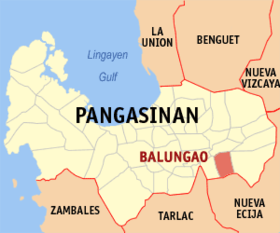Balungao
Appearance
| Balungao | |
|---|---|
| Baley na Filipinas | |
 | |
 Lokasyon na Balungao | |
 | |
| 15°54′0″N 120°42′0″E | |
| Dalin | Filipinas |
| Angipaletnegan | Marso 19, 1815 |
| Barangay | 21 |
| Kaawang | |
| • Katiponan | 73.25 km2 (28.28 sq mi) |
| Elebasyon | 50 m (160 ft) |
| Bilang na too (Mayo 1, 2020)[1] | |
| • Katiponan | 30,004 |
| • Densidad | 410/km2 (1,100/sq mi) |
| Economia | |
| • Clase | kumapat ya klase ya baley |
| • Ingresos | ₱155,537,346.16 (2020) |
| • Activos | ₱417,169,580.51 (2020) |
| • Pasivos | ₱28,161,625.19 (2020) |
| • Gastos | ₱112,793,649.32 (2020) |
| Kodigo na postal | 2442 |
| Kodigo na lugar | 75 |
Say Balungao et kumapat ya klase ya baley ed luyag na Pangasinan, Filipinas. Unong ed 1 Mayo 2020 census, say populasyon to et 30,004 totoo tan 7,908 abong. Walay kabaleg tan sukat to ya 73.25 sq. km. Say zip code to et 2442.
Saray barangay
[dumaen | dumaen so pinanlapuan]- Angayan Norte
- Angayan Sur
- Capulaan
- Esmeralda
- Kita-kita
- Mabini
- Mauban
- Poblacion
- Pugaro
- Rajal
- San Andres
- San Aurelio 1st
- San Aurelio 2nd
- San Aurelio 3rd
- San Joaquin
- San Julian
- San Leon
- San Marcelino
- San Miguel
- San Raymundo
Demograpiko
[dumaen | dumaen so pinanlapuan]| Taon | Pop. | ±% p.a. |
|---|---|---|
| 1903 | 5,853 | — |
| 1918 | 8,515 | +2.53% |
| 1939 | 10,912 | +1.19% |
| 1948 | 12,773 | +1.77% |
| 1960 | 13,184 | +0.26% |
| 1970 | 14,989 | +1.29% |
| 1975 | 16,745 | +2.25% |
| 1980 | 17,342 | +0.70% |
| 1990 | 21,473 | +2.16% |
| 1995 | 21,274 | −0.17% |
| 2000 | 23,813 | +2.45% |
| 2007 | 25,214 | +0.79% |
| 2010 | 26,678 | +2.08% |
| 2015 | 31,106 | +2.97% |
| 2020 | 30,004 | −0.71% |
| Reperensiya: Philippine Statistics Authority[2][3][4] | ||
Saray reperensiya
[dumaen | dumaen so pinanlapuan]- ↑ "2020 Census of Population and Housing (2020 CPH) Population Counts Declared Official by the President". Hulyo 7, 2021. https://psa.gov.ph/content/2020-census-population-and-housing-2020-cph-population-counts-declared-official-president.
- ↑ Census of Population (2015). "Region I (Ilocos Region)". Total Population by Province, City, Municipality and Barangay. PSA. Retrieved 29 June 2016.
- ↑ Census of Population and Housing (2010). "Region I (Ilocos Region)". Total Population by Province, City, Municipality and Barangay. NSO. Retrieved 29 June 2016.
- ↑ Censuses of Population (1903–2007). "Region I (Ilocos Region)". Table 1. Population Enumerated in Various Censuses by Province/Highly Urbanized City: 1903 to 2007. NSO.
